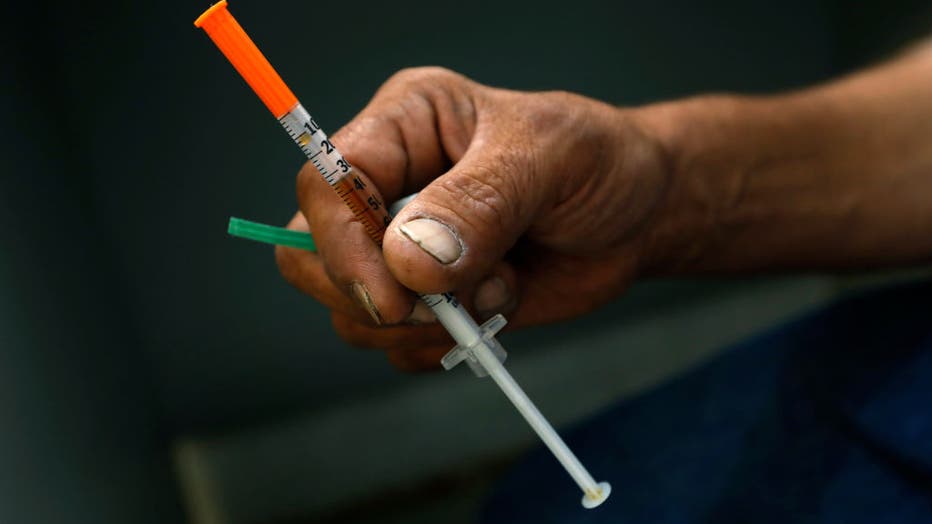Overdose deaths see largest one-year decline ever: Here’s why

HHS Sec. RFK Jr. speaks on opioid crisis
U.S. Health and Human Services Secretary Robert F. Kennedy Jr. addressed the opioid crisis Thursday while speaking in Nashville, Tennessee.
LOS ANGELES - The United States recorded 30,000 fewer drug overdose deaths in 2024 compared to the year before, according to newly released data from the Centers for Disease Control and Prevention — marking the biggest one-year decline in over four decades of tracking.
The CDC estimates 80,000 people died of overdoses last year, down 27% from 110,000 deaths in 2023. That drop is unprecedented in scale; the previous largest decline was just 4% in 2018.
Why are overdose deaths finally declining?
Big picture view:
Health officials and researchers aren’t certain what caused the sharp drop, but several developments are believed to have played a role. These include:
- Wider access to naloxone, the overdose-reversing drug, now available over-the-counter.
- Expanded addiction treatment programs.
- Changes in drug use patterns.
- A growing public awareness and response from grieving families and communities.
- Significant investments from opioid lawsuit settlements now being used to fund prevention, harm reduction, and recovery efforts.
"It’s clear we’ve made progress, but we’re still losing too many people," the CDC said in a statement, noting that overdoses remain the leading cause of death for Americans aged 18 to 44.
Where the declines are happening
Local perspective:
Nearly every state saw a drop in overdose deaths in 2024. Ohio, West Virginia, and other long-suffering states reported some of the steepest improvements. Only two states — Nevada and South Dakota — saw slight increases.
In New York, final numbers are still being processed, but provisional data shows the state following the national trend with a significant decrease. The city and state have ramped up naloxone distribution, safe-use programs, and community outreach in recent years.
What's next:
Billions of dollars from opioid lawsuit settlements are now beginning to make their way into communities. The money, paid by drugmakers, distributors, and pharmacy chains, is earmarked for addiction services and overdose prevention.
A major upcoming settlement — involving up to $7 billion from Purdue Pharma’s owners, the Sackler family — could bring even more resources. But how states spend the money remains a key issue.

A man holds a syringe while preparing to inject drugs at a harm reduction site. Increased access to naloxone and addiction treatment is being credited for the record drop in U.S. overdose deaths in 2024. (Photo by Carolyn Cole / Los Angeles Times via Getty Images)
"States can either say, ‘We won, we can walk away,’ or they can stay the course," said Regina LaBelle of Georgetown University, who previously served as acting director of the White House drug policy office.
Concerns about policy shifts
The other side:
Despite the positive numbers, some public health experts worry that recent moves by the Trump administration could undercut long-term progress. Health Secretary Robert F. Kennedy Jr. defended staffing cuts and program overhauls during a Wednesday hearing, but lawmakers questioned whether the changes would slow momentum.
"Now is not the time to take the foot off the gas pedal," warned Dr. Daniel Ciccarone of UCSF.
U.S. Rep. Madeleine Dean, a Democrat from Pennsylvania, challenged Kennedy, asking "why the hell" the administration is cutting funding when the recent decline proves that public health investments were "getting us somewhere."
What they're saying:
"I will tell you that if you are successful in banning fluoride … we better put a lot more money into dental education," said Rep. Mike Simpson of Idaho in the same hearing — illustrating growing concerns that shifts in health policy could have ripple effects.
Advocates say community action has helped move the needle.
"We believe that taking a public health approach that seeks to support — not punish — people who use drugs is crucial to ending the overdose crisis," said Dr. Tamara Olt, who lost her 16-year-old son to a heroin overdose in 2012 and now leads the group Broken No Moore.
Kimberly Douglas, whose 17-year-old son died in 2023, credited the growing movement of parents and advocates.
"Eventually people are going to start listening," she said. "Unfortunately, it’s taken 10-plus years."
The Source: This report is based on data released by the Centers for Disease Control and Prevention and reporting from the Associated Press. Additional insights were provided by health experts, members of Congress, and advocacy organizations during public hearings and interviews.

